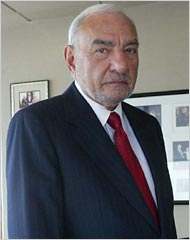 So, the controversy over the Mitchell Commission Report has pretty much died down, right? Well, it looks as if another potential public relations nightmare is brewing for Major League Baseball:
So, the controversy over the Mitchell Commission Report has pretty much died down, right? Well, it looks as if another potential public relations nightmare is brewing for Major League Baseball:
Tucked away inside the United States attorney’s office in the Northern District of California are documents that link more than 100 major league baseball players to positive tests for steroids conducted in 2003.
The test results were meant to be anonymous, and a battle over access to them has wound its way through the federal court system. The players union has tried to protect its members by arguing that the government illegally obtained the information.
But now, more than four years after federal agents seized the test results as part of the investigation into the drug-distribution activities of the Bay Area Laboratory Co-operative, the government appears close to prevailing in the legal battle, which could set off another round of federal drug investigations.
According to a lawyer who spoke on condition of anonymity because the government’s plans are supposed to remain confidential, federal authorities will seek to question each of the 104 players about where and how they obtained the substance detected in their urine samples.
The authorities then intend to distribute the information they receive to federal prosecutors around the country.
Distributors, not users, have been the focus of the government’s investigations into performance-enhancing drugs ever since the authorities began seriously looking into the issue in 2002. But the 104 players would be asked to provide testimony — to federal agents or before grand juries — to lead investigators to the distributors. The players’ identities could become public if their testimony is used in government documents to obtain search warrants or to charge individuals. The players could also be called as witnesses at trials.
Regardless of how many of the 104 names eventually become public, the notion of simultaneous drug investigations being conducted by various federal attorney’s offices around the country would be a significant setback to Major League Baseball, which has struggled to get control of the issues related to performance-enhancing drugs. [. . .]
Read the entire article. The MLB Players Association has to be kicking itself for not insisting on the destruction of the "anonymous" drug tests, which were conducted during the 2003 season. Under public pressure to agree to some regulation of performance-enhancing drugs, the Players Association had agreed to the 2003 testing as a "survey" under which all players would be tested one time and 240 players would be randomly tested a second time with neither group being under any threat of punishment. Subsequently, discovery in connection with the investigation into the Balco case in Northern California transcended the deal between Major League Baseball and the Players Association, so now it appears that there is a good chance that a master list of all players who tested positive during the 2003 testing may well become public information. The list won’t be released tomorrow or even next week, so most of the mainstream media will continue to focus on such sideshows as the Mindy McCready affair. But you can bet that Major League Baseball and the Players Association can hear the clock ticking on this one.
Like this:
Like Loading...
 This Wall Street Journal editorial pats itself on the back justifiably for swimming against the mainstream media tide in opposing from the outset former New York Attorney General Eliot’s Spitzer’s popular but dubious litigation and propaganda campaign against former New York Stock Exchange chief executive officer, Richard Grasso. The Spitzer-inspired case against Grasso fell apart earlier this week under the weight of multiple negative appellate decisions.
This Wall Street Journal editorial pats itself on the back justifiably for swimming against the mainstream media tide in opposing from the outset former New York Attorney General Eliot’s Spitzer’s popular but dubious litigation and propaganda campaign against former New York Stock Exchange chief executive officer, Richard Grasso. The Spitzer-inspired case against Grasso fell apart earlier this week under the weight of multiple negative appellate decisions.








